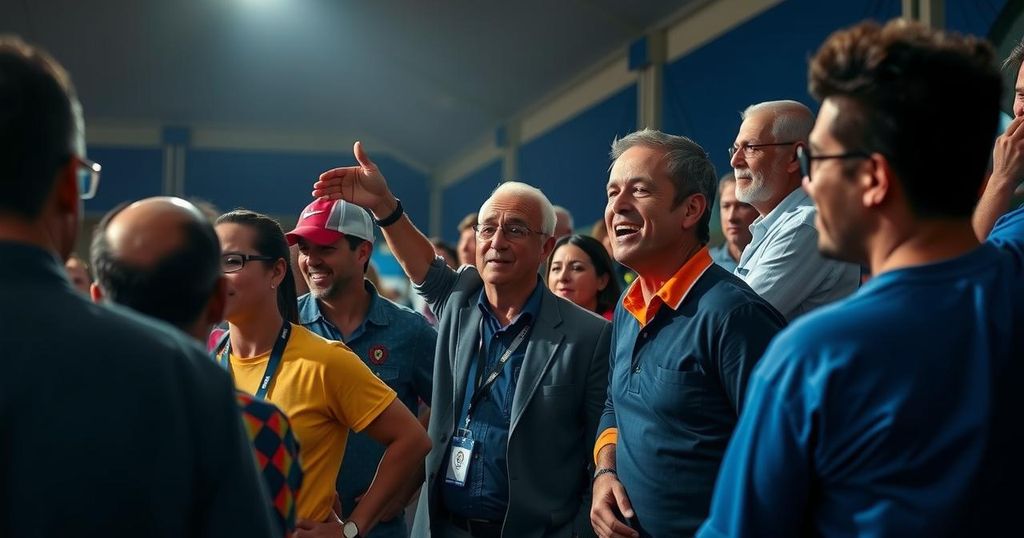World news
2024 ELECTIONS, ARGENTINA, ASIA, BRAZIL, BRICS, COLORADO PARTY, CUBA, DELGADO, ELECTION, ELECTIONS, FRENTE AMPLIO, JOSE “ PEPE, LUIS LACALLE POU, MEXICO, MUJICA, NATIONAL PARTY, NORTH AMERICA, OR, PHILIPPINES, PRESIDENTIAL ELECTION, SOUTH AMERICA, TRADE RELATIONS, URUGUAY, VENEZUELA, VOTER TURNOUT
Maya Ramirez
0 Comments
Uruguay’s Presidential Run-Off: A Choice Between Left and Right
Uruguay is conducting its presidential run-off election, where voters will choose between leftist candidate Yamandu Orsi and right-wing candidate Alvaro Delgado. Former President Jose Mujica’s Broad Front aims to reclaim leadership after five years of right-wing governance. Poll results suggest a close contest, with candidates vying for the support of undecided voters and those who supported smaller parties. The election occurs in a context of economic challenges, with voter sentiment appearing uncertain.
Voting is currently in progress for Uruguay’s presidential run-off election, where the leftist alliance, led by former President Jose “Pepe” Mujica, seeks to reclaim power following five years of right-wing governance. The electorate of approximately 3.4 million citizens must choose between Yamandu Orsi, representing the leftist Frente Amplio (Broad Front), and Alvaro Delgado from the National Party, aligned with the outgoing President Luis Lacalle Pou’s center-right Republican Coalition. Polls indicate a notably close contest, with less than 25,000 votes possibly distinguishing the two candidates.
Poll stations opened at 8 a.m. local time and are scheduled to close at 7:30 p.m., with initial results expected shortly thereafter. Orsi secured a significant 43.9 percent of the vote in the preceding October elections, whereas Delgado garnered 26.8 percent, bolstered by the support of the conservative Colorado Party. Notably, there exists a lack of absolute majority for either coalition in the lower house, though Orsi’s Broad Front holds a majority in the Senate with 16 of 30 seats.
Both candidates are attempting to gain the support of approximately 8 percent of voters who supported smaller parties in the initial round, as well as those who abstained. Despite the pressing economic challenges faced by voters, particularly concerning inflation and living costs, neither campaign has introduced substantial new pledges in the final days leading to the election. Public sentiment remains fluid, as indicated by comments from voters such as Rosario Gusque, who expressed uncertainty about her choice after the recent debate.
Uruguay is currently navigating its electoral landscape with the presidential run-off election, following a period of right-wing governance that commenced five years ago. The upcoming vote determines the pivotal leadership direction of the nation between leftist and right-wing ideologies. Historically, elections in Uruguay have exhibited less polarization compared to neighboring countries in Latin America, which lends a certain degree of predictability to electoral outcomes. The electoral process underscores the public’s response to pressing issues such as crime rates, economic stability, and living costs, setting the stage for a potential shift in political alignment.
The impending presidential run-off in Uruguay represents a significant decision point for its electorate as they weigh the prospects of a returning leftist government against the backdrop of the past five years under right-wing leadership. With both candidates lacking an absolute majority in the lower house and vying for undecided voters, the outcome may hinge on additional support garnered from smaller parties. The run-off holds implications not only for domestic policy but also for broader regional trends in government stability amid economic challenges.
Original Source: www.aljazeera.com




Post Comment